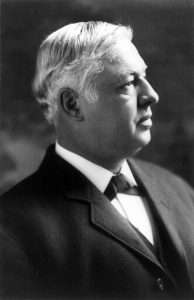The Volokh Conspiracy
Mostly law professors | Sometimes contrarian | Often libertarian | Always independent
Today in Supreme Court History: December 17, 1910
12/17/1910: Justice Joseph Rucker Lamar nominated to the Supreme Court.

Editor's Note: We invite comments and request that they be civil and on-topic. We do not moderate or assume any responsibility for comments, which are owned by the readers who post them. Comments do not represent the views of Reason.com or Reason Foundation. We reserve the right to delete any comment for any reason at any time. Comments may only be edited within 5 minutes of posting. Report abuses.
Please to post comments


Illinois Central R.R. Co. v. McKendree, 203 U.S. 514 (decided December 17, 1906): Secretary of Agriculture can't make a regulation (here, a "quarantine line" from California to Maryland to control cattle infection) that affects interstate commerce without specific Congressional authority; regulation also affected intrastate commerce and being indivisible was void in its entirety
NLRB v. Saviar Mfg. Co., 245 U.S. 359 (decided December 17, 1973): certification of union voided where before certification election the union promised that anyone who voted for certification would have their initiation dues waived
Arlan's Dept. Store of Louisville v. Kentucky, 371 U.S. 218 (decided December 17, 1962): dismisses First Amendment Establishment Clause objections to state statute prohibiting employing persons on Sunday; in dissent Douglas makes the point (obvious to us nowadays) that statute favors Christianity in opposition to Judaism and Islam
The Kentucky statute was challenged not because it favored Christians, but because it allegedly disfavored them.
The Supreme Court had already upheld Sunday closing laws in several states (with Douglas typically dissenting by himself). What made the Kentucky statute different was that it actually exempted individuals who observed their Sabbath on days other than Sunday. It was the attempt to accommodate non-Christians that violated the Establishment Clause, according to those challenging the statute. Though, as you noted, the Supreme Court upheld the statute.
EDIT: I'll add that Douglas has a better point here than in his other facially-neutral Sunday-closing dissents. This was a law essentially ordering Christians to observe the Third Commandment. (Remember the Sabbath day, to keep it holy.)
Thanks
I was curious, so I read the case and the Kentucky Court of Appeals decision below. The case arose out of the criminal prosecution of three store owners for operating on Sunday. It's not clear from the decision whether the store owners were prosecuted for employing Christians on Sunday or for themselves working on Sunday while being Christian.
Pretty sure that Douglas is right here, though I'm not sure whether it should be an establishment clause challenge or an equal protection one. Blue laws themselves are bullshit, but a law that says that "members of a religious society" that observes a different sabbath are exempt is even more egregious.
It could be made religiously neutral by saying that all businesses must be closed one day in seven (or that all employees must be given one day off per week — New York has such a law), but a law that fixes the Christian sabbath as a day off unless one is a member of a religion that observes a different day is definitely not that.
Justice Lamar (who was actually confirmed) managed not to be involved in any of the 100 court cases.